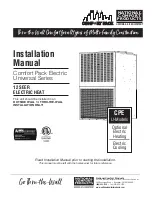
27
0472-M009-7
6
In caso di pavimentazione esistente, della quale non sia possibile
verifi care con certezza le caratteristiche, occorre realizzare un ido-
neo getto di fondazione, per una superfi cie minima di m 4,00x1,50;
con profondità di 25 cm e doppia armatura come descritto sopra.
QUALORA ESISTESSERO DUBBI SULLA EFFETTIVA CONSI-
STENZA DELLA PAVIMENTAZIONE CONSULTARE UN TECNICO
QUALIFICATO.
Il sollevatore deve essere fi ssato alla pavimentazione tramite tassel-
li ad espansione meccanici tipo HILTI HSL-TZ 10/25 o similari op-
pure tramite ancoraggi chimici in fi ale HILTI HVU-M12x110 o simi-
lari, con barra fi lettata M12 in acciaio classe 5.8 o superiore.
Gli ancoraggi utilizzati debbono avere un carico minimo ammissibi-
le a trazione > = a 1133 kg (nelle condizioni di posa indicati).
ATTENZIONE.
Per il KPN349 utilizzare tasselli ad espansione mec-
canici tipo HILTI HSL-TZ 12/25 o similari.
Gli ancoraggi utilizzati debbono avere un carico minimo ammissibi-
le a trazione >= a 1400 kg (nelle condizioni di posa indicati).
N.B.
si consiglia di poggiare la base delle colonne direttamente sul
calcestruzzo anche in presenza di pavimentazione riportata. Tuttavia
se questa è di buona qualità è possibile fi ssare le colonne diretta-
mente sul pavimento, utilizzando ancoraggi di lunghezza adeguata.
In relazione alla profondità del calcestruzzo rispetto al piano del
pavimento, I TASSELLI DEBBONO AVERE LUNGHEZZA IDONEA
A RAGGIUNGERE IL PAVIMENTO PORTANTE. (vedi fi g. 1a).
In the case of existing fl oors, where such characteristics cannot be
checked a foundation cement casting should be laid for a minimum
surface area of m 4.00x1.50;
with a depth of 25 cm having double reinforcement as described
above.
WHENEVER THERE ARE DOUBTS ABOUT THE ACTUAL CON-
SISTENCY OF THE FLOOR, YOU ARE ADVISED TO CONTACT A
QUALIFIED TECHNICIAN.
The lift must be secured to the fl oor with mechanical screw anchors
of the type HILTI HSL-TZ 10/25 or similar or with chemical anchors
(vials) HILTI HVU-M12x110 or similar, with a M12 threaded bar in
steel class 5.8 or higher.
Anchor bolts used shall have minimum driving load > = 1133 kg (in
the indicated laying conditions).
CAUTION.
For KPN349 use mechanical expansion blocks of the
HILTI HSL-TZ 12/25 type or similar ones.
The fasteners used must have a minimum allowed tensile strength
of >= 1400 kg (in the indicated laying conditions).
NOTE:
We suggest placing the base plate of the post directly on the
concrete, even where the fl oor has been added. If this latter is of
good quality, the posts can be fi tted directly onto the fl ooring, using
longer anchor bolts.
As far as concrete thickness with respect to fl oor level is concerned,
ANCHOR BLOCKS MUST BE OF SUITABLE LENGTH SO TO
REACH MAIN BEARING FLOOR. (see fi g. 1a).
Sollte bereits ein Bodenbelag vorhanden sein, bei dem es nicht
möglich ist, die Eigenschaften mit Sicherheit festzustellen, muss ein
angemessenes Fundament mit einer Mindestfl äche von 4,00x1,50 m
aufgeschüttet werden, dessen Tiefe 25 cm entspricht und das, gemäß
vorstehender Angaben, über eine doppelte Bewehrung verfügt.
SOLLTEN ZWEIFEL ÜBER DIE EFFEKTIVE KONSISTENZ DES
BODENS BESTEHEN, MUSS MAN SICH AN EINEN QUALIFIZIER-
TEN TECHNIKER WENDEN.
Die Hebebühne muss mit mechanischen Spreizdübeln vom Typ HIL-
TI HSL-TZ 10/25 oder ähnlichen am Boden befestigt werden oder
auch mittels chemischen Verankerungsmitteln
HILTI HVU-M12x110 oder ähnlichen, mit Gewindestange M12 in
Stahl der Klasse 5.8 oder darüber.
Die verwendeten Verankerungen müssen eine zulässige Minde-
stzugkraft von > = auf 1133 kg aufweisen (Unter den angegebenen
Einbaubedingungen).
ACHTUNG.
Beim Modell KPN349 mechanische Spanndübel vom
Typ HILTI HSL-TZ 12/25 oder ähnliche verwenden. Die verwendeten
Verankerungen müssen eine zulässige min. Zugbelastung von >=
1400 kg aufweisen (Unter den angegebenen Einbaubedingungen).
HINWEIS:
Es wird empfohlen, das Gestell der Säulen direkt auf dem
Beton abzustellen, auch wenn es sich um einen aufgeschütteten
Bodenbelag handelt. Sollte er von guter Qualität sein, können die
Säulen mit Verankerungen von angemessener Länge auch direkt
am Boden befestigt werden.
Unter Bezugnahme auf die Tiefe des Betons gegenüber der Boden-
fläche, MÜSSEN DIE DÜBEL EINE ANGEMESSENE LÄNGE
AUFWEISEN, DIE DAS ERREICHEN DES TRAGENDEN BODENS
ERMÖGLICHT (siehe Abb. 1a)
Si le dallage existe déjà et qu’il n’est pas possible de vérifi er avec
certitude les caractéristiques minimales susmentionnées, il faut réa-
liser une fondation en béton d’une surface minimale de 4,00 x 1,50
m, d’une profondeur de 25 cm, avec une double armature comme
décrit plus haut.
EN CAS DE DOUTES SUR LA SOLIDITÉ EFFECTIVE DU SOL,
S’ADRESSER À UN TECHNICIEN QUALIFIÉ.
Le pont élévateur doit être fi xé au sol par le biais de vis tamponnées
de type HILTI HSL-TZ 10/25 ou similaires ou bien à l’aide d’ancrages
chimiques en ampoule HILTI HVU-M12x110 ou équivalent, avec une
barre fi letée M12 en acier catégorie 5.8 ou supérieure.
Les ancrages utilisés doivent avoir une charge minimum admissible
à traction > = 1133 kg (dans les conditions de pose indiquées).
ATTENTION.
Utiliser des chevilles expansibles mécaniques de type
HILTI HSL-TZ 12/25 ou similaires pour le modèle KPN349.
Les ancrages utilisés doivent avoir une portée minimale admissible
à la traction >= à 1400 kg (dans les conditions de pose indiquées).
Remarque:
Nous conseillons de poser la plaque de base des co-
lonnes directement sur le béton, même si un dallage est réalisé: si
ce dernier est de bonne qualité, il est toutefois possible de fi xer les
colonnes directement sur le dallage, en effectuant un ancrage plus
profond.
En référence à la profondeur du béton par rapport à la surface du
sol, LES VIS TAMPONNEES DOIVENT ETRE DE LONGEUR ADAP-
TEE POUR ARRIVER AU SOL PORTEUR. (voir fi g. 1a)
En caso de pavimento existente del cual no se puedan comprobar
con certeza las características, es necesario efectuar una colada de
cimentación sobre una superfi cie mínima de m 4,00x1,50; con una
profundidad de 25 cm y doble armadura como se indica anterior-
mente.
SI SURGEN DUDAS SOBRE LA RESISTENCIA EFECTIVA DEL
PAVIMENTO, CONSULTAR UN TÉCNICO CUALIFICADO.
El elevador debe ser fi jado al pavimento por medio de tornillos de
expansión mecánicos tipo HILTI HSL-TZ 10/25 o similares o por
medio de anclajes químicos en ampollas HILTI HVU-M12x110 o
similares, con barra roscada M12 de acero clase 5.8 o superior.
Los anclajes utilizados deben tener una carga mínima aceptable de
tracción > = a 1133 kg (en las condiciones de instalación indicadas).
ATENCIÓN
. Para el KPN349 usar espigas de expansión mecánicas
tipo HILTI HSL-TZ 12/25 o similares
Los anclajes usados deben tener una carga mínima admisible a la
tracción >= a 1400 kg (en las condiciones de instalación indicadas).
NB.
Se recomienda apoyar la base de las columnas directamente
sobre el hormigón aun en presencia de piso reportado. Sin embargo
si éste último es de buena calidad es posible fi jar las columnas di-
rectamente al pavimento, utilizando anclajes de longitud adecuada.
Con relación a la profundidad del hormigón respecto al espesor del
pavimento, LOS TORNILLOS DEBEN SER SUFICIENTEMENTE
LARGOS PARA ALCANZAR EL PAVIMENTO PORTANTE. (véase
fi g. 1a)
Summary of Contents for KPN345WE
Page 18: ...18 0472 M009 7 3 A kg 400 kg 1200 ...
Page 28: ...28 0472 M009 7 6 2 4 3 A B C D ...
Page 34: ...34 0472 M009 7 10 8 9 6 13 mm A 36 FC1 FC2 B F D E C 2 cm ...
Page 36: ...36 0472 M009 7 6 9 10 A NO A A 8 8 ...
Page 40: ...40 0472 M009 7 14 15 7 A A 02 1 ...
Page 44: ...44 0472 M009 7 9 17 18 2 mm 16 a b max mm 10 min mm 2 ...
















































